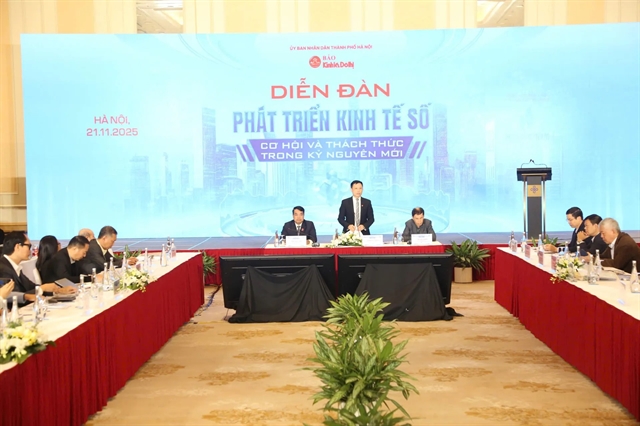 Economy
Economy


|
| The Kinh tế & Đô thị (Economic & Urban Affairs) newspaper organised a forum digital economy development in Hà Nội on Friday.— Photo kinhtedothi.vn |
HÀ NỘI — Digital urban governance is seen as a strategic breakthrough, helping Hà Nội reduce transaction costs, improve transparency and complete its digital ecosystem. This, in turn, lays the foundation for building a smart city and a regional centre for innovation.
The Kinh tế & Đô thị (Economic & Urban Affairs) newspaper organised a forum on digital economy development in Hà Nội on Friday.
In his opening speech, Nguyễn Thành Lợi, editor-in-chief of the Economic & Urban Affairs newspaper, stated that the Party and the State had identified digital transformation and the development of the digital economy as long-term strategic directions.
Resolution No 57-NQ/TW, along with a series of national programmes on the digital economy and digital society, have set clear targets: bringing the share of the digital economy to 20 per cent of GDP by 2025 and around 30 per cent by 2030.
For Hà Nội, the goals are even higher than the national average. The city aims for the digital economy to contribute 25–30 per cent of GRDP by 2025, reaching 40 per cent by 2030.
This is not only a growth target but also reflects the determination to build a new growth model based on technology, data and innovation, he said.
The digital economy is helping Việt Nam enhance its international competitiveness, attract high-quality investment and increase value in global supply chains, said Professor Dr Nguyễn Thường Lạng from the National Economics University.
The implementation of national data platforms, improving the digital legal framework and promoting creativity are key pillars for Việt Nam to integrate more deeply and sustainably into the global economy, he added.
For Hà Nội, the potential for developing the digital economy is much greater than many other localities, thanks to relatively complete technological infrastructure, a high-quality workforce and rapid urbanisation.
Dr Nguyễn Đức Kiên, former deputy chairman of the National Assembly’s Economic Committee, affirmed that the digital economy is becoming one of the most important development spaces for major cities around the world.
Hà Nội has all the necessary conditions to become a regional innovation centre, he noted.
However, along with opportunities, there are significant structural challenges, especially for small and medium-sized enterprises (SMEs), which account for over 97 per cent of businesses in the capital.
According to a survey by the Hanoi Association of Small and Medium Enterprises (HANOISME), 54 per cent of SMEs in Hà Nội do not have a dedicated IT department, and 62 per cent reported insufficient budgets to implement systematic digital transformation.
The lack of standardised data, high compliance costs and increasingly stringent international standards create barriers that prevent businesses from keeping up with market speed.
Building digital urban governance
At the forum, experts agreed that the digital economy could only develop when urban governance played the role of the backbone.
Dr Nguyễn Đức Kiên pointed out systematic limitations such as the lack of data interoperability between agencies, adding that work processes were still heavily dependent on traditional paperwork, which results in high transaction costs for citizens and businesses.
A modern government needs to operate based on data, online public services, automated processes and high transparency, he added.
This is the foundation for creating a smart city, where all interactions between citizens, businesses and the state are fast, efficient and paperless, said Kiên.
"Urban governance must be the strongest driving force in digital transformation," he emphasised. Kiên also said that a smart city must be citizen-centred.
Hà Nội faces numerous challenges such as traffic congestion, air pollution and overpopulation.
Developing a smart public transport system, digitising bus operations and connecting them with the metro would help citizens reduce waiting times and improve the use of public transport, he noted.
Going further, Kiên suggested that building digital urban governance should be associated with popularising digital thinking among citizens.
When people become familiar with online public services, digital payments and interacting with the government through data platforms, the entire urban ecosystem will shift towards a more civilised and sustainable direction, he said.
Digital transformation not only creates growth value but also contributes to protecting consumers' rights, ensures social security and clarifies the characteristics of a socialist-oriented market economy, he noted. — VNS




